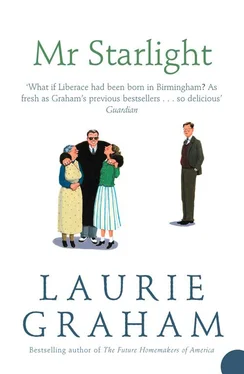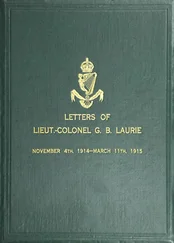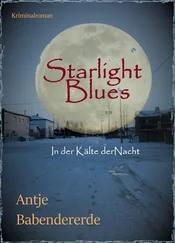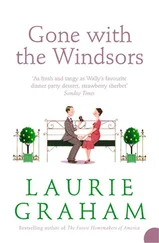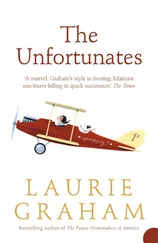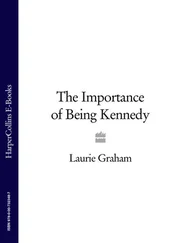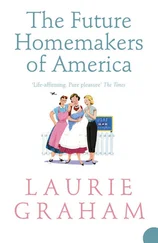I was worried about him because the Grammar School was boys only. I said, ‘He’s going to miss Joan and Vera.’
‘Selwyn makes friends wherever he goes,’ she said. ‘And there’s time enough for girls later.’
And it was true, he did have the knack of playing the fool and winning folks over, even the ones who called him a sissy. It was as though he was daring the whole world not to like him.
When Dilys was eighteen she started walking out with Arthur Persons. Mam never let them out of her sight. They had to keep the door open while they said goodnight out on the front step, even if there was a gale blowing, and if she couldn’t be in the room supervising them, I had to keep watch.
‘Play your new piece for Arthur,’ Mam’d say, which meant she needed to go outside and pay a penny and I was supposed to guard our Dilys’s virtue.
Poor Arthur. He endured two years of that while they saved up for a bed and some easy chairs, and then they got married, in the spring of 1933. The wedding took place at Miller Street Congregational. Dilys wore a blue suit made for her by Mrs Grimley and Uncle Teilo walked her up the aisle, our dad having had to rush away to Gloucester to follow up a business opportunity. Me and Selwyn were attendants. I wasn’t keen but Dilys begged me. I was twelve years old by then and I’d seen some of the get-ups attendants were expected to wear. There were often weddings round the corner at St Botolph’s and I’d seen boys dressed in velveteen and lacy collars. But Mam said there’d be nothing like that, just a bath the night before and a nice clean shirt and tie, so I agreed. Sel had long white socks and new shoes, and he carried a lucky cardboard horseshoe to give to the happy couple as they came out of the chapel, and the reason I remember that is he was so pleased with his white socks he spent the whole time looking at them and worrying in case they got smudged. If you look at Dilys’s wedding photo all you can see of him is the top of his head because he’s busy gazing down at his legs.
Dilys and Arthur started off in one room at Arthur’s parents’ house in Tysely, and then they got a flat with shared kitchen and bathroom on the Pershore Road, and all the while Arthur was climbing the ladder at Aldridge’s Machine Tools and doing very well for himself. By the time Dilys was in the family way they were buying a house at Great Barr with a garden front and back, so much down and then so much per month.
Every so often Dad would turn up with a bag of laundry and holes in his socks, and I’d be sent to Jewks’s for a skein of darning wool. ‘And while you’re out,’ Mam’d whisper, ‘run round to Uncle Teilo’s and tell him your father’s home.’
It was one of Dad’s homecomings that led to a big falling out between Mam and Dilys.
‘Tell Arthur your father’s available for work,’ Mam said.
‘No need,’ Dilys said. ‘I expect they’ll be giving it out on the wireless. But Arthur can’t get him work.’
‘Of course he can,’ Mam said. ‘If he’s any kind of son-in-law. If he’s as high up at Aldridge’s as he cracks on.’
Dilys said, ‘If Arthur sullied his hands setting Dad on he soon wouldn’t be anything at Aldridge’s. I’m not asking him.’
Mam said, ‘Then I’ll get him a start. I’ll go to Aldridge’s myself and tell them who I am.’
‘Don’t you bloody dare,’ Dilys was shouting. ‘Don’t you bloody bloody dare.’ I could see her point of view. There were always complications where Dad was involved, complications and recriminations. It was just as well Dilys stood her ground because Arthur was too mild to have done it for himself.
Then Dad went off to the Labour Exchange one morning and didn’t come back. It was the usual pattern.
Mam said, ‘I expect he was offered something. He’d heard there might be an opening in the Potteries. That’s how it is. If an opportunity presents itself you have to jump in quick, before someone else does. You don’t have time for goodbyes.’ But I noticed his spare shirt was gone and so was my Brylcreem.
I went over to Dilys’s to tell her Gypsy was gone. I said, ‘So you and Mam can patch things up now.’
‘I don’t know,’ she said. ‘It’s quite a relief not having to see her.’
I said, ‘Sel misses you.’
‘Bring him over on the bus,’ she said. ‘I’d like that. And Mam doesn’t need to know.’
But however much Sel missed Dilys it wasn’t enough for him to go behind Mam’s back. ‘No,’ he said. ‘Mam’s the mam and Dilys is the girl, so what Mam says goes. And if you go to Dilys’s again, I’m telling.’
So we were incommunicado until Arthur came round one night and said Dilys had had two lovely baby girls and it was time to let bygones be bygones. And as it was Dad they’d quarrelled over and he himself was a bygone just then, Mam relented and we all went to see the new arrivals. They’d named them Betsan and Gaynor.
I was fifteen and Sel was nine, which seemed young to be uncles, but we were both pretty chuffed about it.
Dilys said, ‘Sit on those kitchen chairs, the pair of you, and each of you hold one of the babies.’
I was up for it, but Sel wouldn’t. ‘Their legs are too thin,’ he said. ‘And they’ve got funny skin.’
There were certain things he never liked to touch and there was no persuading him. He could be very funny that way.
‘Well, Dilys,’ Mam said. ‘Now you’ve got your work cut out.’
‘Don’t worry,’ Dilys said. ‘I’ve got a good man to help me.’
After that peace broke out and we saw Dilys most weeks. If Villa were playing at home she’d bring the girls over to see Mam while me and Arthur went to the match. I always liked Arthur. He was as gentle as a lamb. Then sometimes we’d go over there, to Great Barr, on a Sunday afternoon and we’d have tinned salmon and salad and pears in syrup or fruit cocktail, and then walnut cake, with white icing and glacé cherries. Happy days.
Then, of course, along came the war and I decided to jump before I was pushed. I tried for the Engineers and when they realised I could get a tune out of a cornet they made me a bandsman, which meant being a medical orderly too in case we saw action. I was at home, on embarkation leave, when Dad turned up. His face suddenly appeared at the kitchen window, cigarette behind his ear, silly grin on his face, as if he’d just come home from work, not been missing, whereabouts unknown, for more than twelve months. ‘Put the kettle on,’ he said. ‘Where’s your mam?’
She was at Spooner’s, fetching gammon for my send-off tea.
‘Bloody wars,’ he said. ‘I did my bit in the last lot. And you’ll be all right at Greely’s. Reserved occupation.’
I said, ‘I volunteered.’
‘Oh yes?’ he said. ‘More fool you. And what are you doing, half-pint?’
Sel was snipping holes in a piece of paper, making a doily for the cake stand. ‘Helping my mam,’ he said. ‘And there won’t be enough gammon for you. You weren’t expected.’
But of course Mam gave up her rasher for Gypsy and when Uncle Teilo called in she came over very light-hearted. Whatever Dad said, she laughed, whatever Teilo said, she laughed, although he didn’t seem to be in a very humorous mood. ‘I’ll be seeing you, Annie,’ he said, as he was leaving. ‘You know where to find me.’
‘Home is the hunter, Teilo,’ she said. ‘So I won’t have to trouble you for any more light bulbs.’
We didn’t sleep much that night. I was wondering what war was going to be like and Sel wasn’t happy about the new arrangements. ‘Don’t go in the army, Cled,’ he said. ‘What if you get shot?’
I said, ‘I have to go, our kid. It’s my duty. And it’s your job to look after Mam.’
Читать дальше
